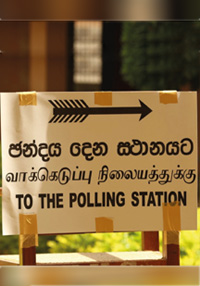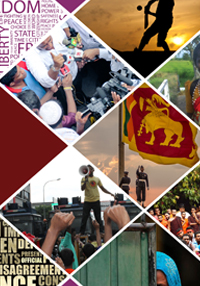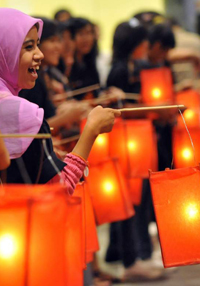බලය බෙදාහැරීම පිළිබද දේශපාලනික සම්මුතියක් නියෝජනය කෙරෙන ව්යවස්ථා ප්රතිසංස්කරණ යෝජනාවලියක් සකස් කිරීම සදහා හිටපු ජනපති මහින්ද රාජපක්ෂ විසින් 2006 ජූලි මාසයේ දී, සර්ව පාක්ෂික නියෝජිත කමිටුව කැදවන ලදී. මෙතෙක් ජාතික ගැටලුව සදහා සුදුසු පිළිතුරක් ලබා ගැනීමට නොහැකිව කෙළවර වුනු රාජ්ය ප්රයත්නවල නවතම පියවරයි.
This report examines the key features and functions of a Mixed-Member Proportional (MMP) electoral system that needs to be considered when engaging in electoral system reform. It provides recommendations that address the President’s election campaign promises on electoral reform. It further reveals the MMP system as the only electoral system that can adequately fulfil the twin imperatives of reintroducing smaller single member (and several multi member) electoral districts and preserving proportional representation (PR) in voting outcomes as outlined in President Maithripala Sirisena’s Election Manifesto
The Sri Lanka Strategic Assessment analyses six spheres of contestation within Sri Lanka’s current political context, and assesses their impact in terms of securing peace and accelerating inclusive growth in the future. These spheres of contestation have been identified and classified along two axes: horizontal contestation and vertical contestation. The former deals with contestation within and between communities, while the latter deals with contestation between the Sri Lankan state and citizens.
මෙෙ අධයයනය සිදු කරන ලද්මද් මවරිමේ පර්මේෂණ (Verité Research) ආයතනමේ ආර්ික පර්මේෂණ කණඩායෙ විසිනි. සුභාෂිණි අමේසිිංහ (ආර්ික පර්මේෂණ ප්රධානි), නිලිංගිකා ප්රනාන්දදු, මර්වතී ඥාණසම්බන්දදන්ද සහ සීzනා හුමසේන්දමෙන්ද සැදුම්ලත් ලත් සාොජිකයින්ද පිරිසක් මෙෙ කණ්ඩායෙට ඇතුළත් විය. මෙෙ වාර්තාව සකසේ කිරීමම්දී පර්මේෂණ කටයුතු සඳහා සහාය ලබාමදමින්ද සෙසේත පර්මේෂණ සහ කර්තෘ අධීක්ෂණ කටයුතු සිදු කරන ලැබුමේ නිශාන්ද ද මෙල් විසිනි. ජාතික අපනයනකරුවන්දමේ ෙණ්ඩලමේ (NCE) සහාය ඇතිව මවරිමේ අයතනය ෙඟින්ද මෙෙ පර්මේෂණ වාර්තාව සකසේ කරනු ලැබිණ. සාර්ථක ෙඟ මපන්දීම් තුළින්දද සම්ුඛ පරීක්ෂණ සඳහා පහසුකම් සපයමින්දද සාකච්ඡා අිංෙ සඳහා සහභාගී මවමින්දද මෙෙ පර්මේෂණ කාර්යය ඉටු කර ෙැනීමෙහිලා දැක්ූ සහමයෝෙය සම්බන්දධමයන්ද ජාතික අපනයනකරුවන්දමේ ෙණ්ඩලය මවත මවරිමේ පර්මේෂණ ආයතනමේ ආර්ික පර්මේෂණ කණ්ඩායෙ සිය සේූතිය පුදකර සිටි.
The Civil Society Organization Sustainability Index (CSOSI) has been used since 1997 to assess the sustainability of the CSO sector. The Index has expanded considerably since its inception – it went from covering 18 countries in the Europe and Eurasia Region, to covering over 60 countries in different regions around the world. By using standard indicators and collecting data each year, the CSOSI enables users to track developments and identify trends in the CSO sector over time while allowing for cross-country and cross-region comparison. It is used by CSO advocates, development partners, and academics to assess international and regional trends in the civil society sector and to identify common obstacles impeding the sector’s sustainability, such as the legal environment, organizational capacity, and financial viability. This is the second time Sri Lanka is participating in the index. Verité Research is the local implementing partner for this initiative.
The Civil Society Organization Sustainability Index (CSOSI) has been used since 1997 to assess the sustainability of the CSO sector. The Index has expanded considerably since its inception – it went from covering 18 countries in the Europe and Eurasia Region, to covering over 60 countries in different regions around the world. By using standard indicators and collecting data each year, the CSOSI enables users to track developments and identify trends in the CSO sector over time while allowing for cross-country and cross-region comparison. It is used by CSO advocates, development partners, and academics to assess international and regional trends in the civil society sector and to identify common obstacles impeding the sector’s sustainability, such as the legal environment, organizational capacity, and financial viability. This is the second time Sri Lanka is participating in the index. Verité Research is the local implementing partner for this initiative.
“In the context of growing bilateral relations with India, this study by Verité Research takes a look at the current status of Sri Lankan exports to India under the existing India – Sri Lanka Free Trade Agreement (ISFTA). The study identifies Non-Tariff Barriers to be a critical factor in the lackluster performance of exports to India in recent years. The case of food exports serves to highlight how compliance with Indian standards and regulations forms one such significant barrier, due to India’s non-recognition of testing and certification conducted outside its borders. The proposed solution to this problem – a Mutual Recognition Agreement – is one that is easily implementablewhich will help exporters enjoy the full benefits of duty concessions offered by the ISFTA and if done right, will help build confidence in the benefits of further integration.”
“In the context of growing bilateral relations with India, this study by Verité Research takes a look at the current status of Sri Lankan exports to India under the existing India – Sri Lanka Free Trade Agreement (ISFTA). The study identifies Non-Tariff Barriers to be a critical factor in the lackluster performance of exports to India in recent years. The case of food exports serves to highlight how compliance with Indian standards and regulations forms one such significant barrier, due to India’s non-recognition of testing and certification conducted outside its borders. The proposed solution to this problem – a Mutual Recognition Agreement – is one that is easily implementablewhich will help exporters enjoy the full benefits of duty concessions offered by the ISFTA and if done right, will help build confidence in the benefits of further integration.”






